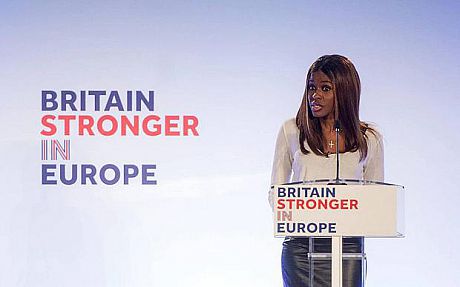Young people won't vote in the EU referendum. The Conservatives have put them off politics for life
Abe Baldry is President of the University of Sussex Students' Union (USSU).
The problem for the pro-EU campaign is simple: young people, although overwhelmingly in favour of Britain remaining part of Europe, are less likely to vote. Unfortunately, attempts to engage millennials in the EU referendum have been patronising, misdirected and twenty years too late.
Attempts to engage 18-24 year olds come across like they’ve been made by people at least twenty years older, and the pro-EU campaigners enlisted to target young people such as Eddie Izzard and June Sarpong are irrelevant to millennials.
 June Sarpong has joined the Remain campaign.
June Sarpong has joined the Remain campaign.
The government has made it clear that young people are not a priority.
As for high profile Brexit campaigners targeting young people, there aren’t any. Chris Grayling and Liam Fox really, really don’t cut it. The younger and better educated are overwhelmingly more likely to vote to remain, which is probably why the Leave campaign’s attempts to engage students and under 25s have been minimal.
The worst example is the #votin advert – complete with clips of young people doing graffiti, raving, flipping through their phones, and talking in a slang that nobody uses – manages to be both patronising and out of touch.
It’s also misguided. British employment (or, as the advert puts it, workin) and Higher Education (learnin) will certainly be affected by leaving the EU, but the last time I checked, EU directives on ravin were pretty thin on the ground.
If it seems jarring to watch the Conservative frontbench attempt to woo eighteen year olds, it’s because they’ve spent the past six years making their lives actively worse.
It’s possible that the #votin campaign has been designed to gain wider media attention by being deliberately bad. If this is the case, credit where it’s due, but it’s hardly attracted Donald Trump levels of free publicity, and it’s made the campaign look out of touch.
The broader problem is that most politicians have consistently ignored young people, and efforts to get them to vote now are twenty years too late. If politicians really cared about engaging young people in the political process then politics should be taught in schools, but this hasn’t happened.
Instead, the government has made it clear that young people are not a priority, reflected in the introduction of £9,000 tuition fees, cuts to youth housing benefit, and the fact that minimum wage increases don’t apply to under twenty-fives.
If politicians want young people to care about the EU, they should have made a positive case for it years ago.
Austerity has been dropped on young people from a great height, and if it seems jarring to watch the Conservative frontbench attempt to woo eighteen year olds, it’s because they’ve spent the past six years making their lives actively worse.
If politicians want young people to care about the EU, they should have made a positive case for it years ago. The road to the EU referendum is littered with missed opportunities to educate young people about the benefits of membership.
This article first appeared on The Independent website.




